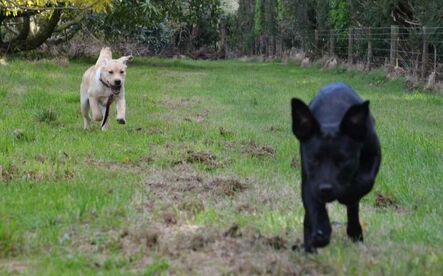|
There’s something inherently joyous about watching dogs play together well. When our dogs have buddies and they play kindly, it fills our hearts and puts a smile on our faces, just as it seems like our dogs are smiling at the end of a good play date.
But there is an interesting balance and a few things that must be understood for these interactions to happen without incident. When we turn up without knowing what we’re getting into, for example, at a public dog park– it may just be a roll of the dice for it to go harmoniously or have some hiccups. So what roles do we observe in multi dog play, and how can we ensure that everyone gets along, instead of push coming to shove? The Goader The goader is the dog we can think of as being the initiator. They often perform behaviours that will get the wrestling started, or the chase. Because they are so excited and set on playing, their behaviour can sometimes seem intense, and borderline on bullying, if the other dog is not reciprocating. You will see behaviours like play-bows, barking in dogs’ faces, darting in and out of other dogs’ personal space, pushing into other dogs etc. The Prey This is the dog who the goader often focuses on. This is not to say the dog doesn't like taking this role, but it is extremely important that we manage their comfort levels, and that they do not slide into the category of being bullied. The prey dog is the one being chased, or pinned by other dogs, and you can tell they are enjoying it if you notice a play break, where they decide to re-engage afterwards. Trying to escape more seriously, hiding behind you, or showing more intense evasive manoeuvres may mean you have to intervene. The Chaser These dogs wait until the goader has gotten the game started, and then they take over. They join in on chase games and enjoy the act of zooming about. Be careful not to let the balance between chasers and prey go in the favour of the chasers, because that can slide into intimidation. The Pacifier The pacifier dog gets uncomfortable with the energy of the play, and will use passive behaviours to try and calm things down. Pushing in between two dogs playing hard to interrupt, or excessive face licking, encourages play breaks between the other dogs. The pacifier can get more stressed if their acts of soothing do not work. The Referee This dog takes on the same role as the pacifier, except that they’re not going to be passive about it. They often want the game to stop more abruptly, and will use more intimidating and intense behaviours to shut down what they believe to be absolute tomfoolery. This can be in the form of snapping, pinning, lunging, or sharp growls: anything that lets the group know that they are not participating and that the other dogs should stop. Now these are broad generalisations for the roles we see in multi dog play, and we do sometimes see these roles change or switch, depending on which dogs are in the game. We find that while breed can play into which roles a dog takes on, it is actually more usually determined by the dog’s general personality type. Introverted dogs will often take on the pacifier and prey roles, while your confident, more extroverted dogs will fall more solidly into the other categories. Overarousal One of the biggest things we need to do when supervising our dogs is to manage their energy levels so the play doesn’t turn into something more sinister. Play can get very energetic, and sometimes that will slip into an actual fight, if one dog gets overwhelmed, or a certain dog isn’t listening to another dog’s cues to tone it down. On top of that, if you get multiple bullies ganging up on a less confident dog, play can slide over into a more pack-mentality, and there is no guarantee that the prey-drive-sequence will not be activated and go too far. What can we do?
It is really important that you incorporate training that builds the value of your dog engaging with you when you are around. Quality time playing with your dog, having a solid recall or hand target, and ensuring your dog has a positive history of spending time with you is imperative when having dog play dates. Our general rule of thumb is this: the amount of time your dog spends playing with other dogs, must be doubled in quality play time with their owner. This is to make sure your attention and play has a larger part in their memory of feeling good, rather than obsessing about playing only with other dogs. So, to summarise: facilitating your dogs’ social life with other dogs takes a lot more than just heading to somewhere where there are other dogs, letting them loose and then catching up on emails on your phone. It takes observation, planning, and interaction from you to make sure that everybody, and everydoggy, enjoys themselves and stays safe. Is your dog the type to see another dog and forget you exist? Do you need some extra support in training the skills of engagement out in public? Get in touch with our team today!
1 Comment
Andrea
11/11/2022 05:48:45 pm
The Chaser, the Goader, the Prey, the Pacifier. What a great post. I am regularly with the same group of dogs that play and your descriptions fit like a glove and some take on multiple roles. I am careful to watch for signs things are going too far; as with children play can turn rough and needs to be managed; whilst also being mindful of dogs relatively unknown to each playing socially.
Reply
Leave a Reply. |
AuthorsArticles created by the team at Allsorts Dog Training, Bay of Plenty, New Zealand Our Library
All
|


 RSS Feed
RSS Feed